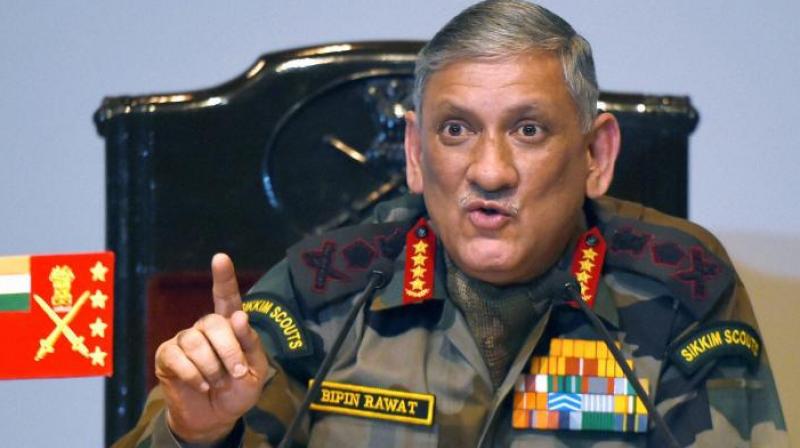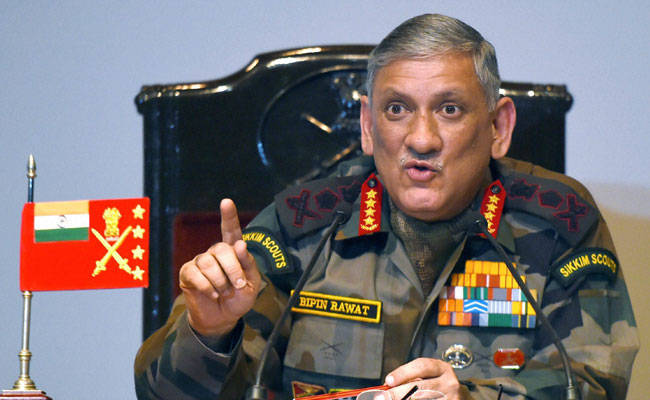
The outpouring of grief over the tragic death of General Bipin Rawat is manifesting itself in an ugly belligerent form, which was never witnessed in the past on similar occasions, like the passing away of army stalwarts – Sam Manekshaw, Arjan Singh and Sundarji. The present state-sponsored display of national mourning over Bipin Rawat’s death is fast degenerating into an orgy of revenge against those who are expressing their misgivings about certain dubious and oppressive acts by the late general during his tenure as both the army chief and later as the Chief of Defence Staff.
Let me give a few examples of such behaviour of revenge against dissenters who refuse to echo the prevailing sycophantic homage to the late general and instead publicly express their disaffection with his misdeeds. Some state governments, in a wild display of their loyalty to General Bipin Rawat, are violently clamping down on these outspoken critics. In Karnataka, the BJP Chief Minister Basavaraj Bommai has directed his police chief to initiate legal action against culprits who have made `derogatory’ remarks on the social media on General Rawat’s death. (Re: Times of India. December 11, 2021). In Kashmir, according to the above mentioned newspaper report, the Jammu and Kashmir Bank suspended a woman employee for her social media post containing `derogatory’ and `inappropriate’ comments on the death of Bipin Rawat. At around the same time, Sabbah Haji, a well known educationist in Kashmir, came out with a statement describing the late General Rawat as a `war criminal’ (a term which she must have used, remembering the atrocities carried out on her people by the Indian jawans under that general’s command). She was arrested soon after, and was given bail on December 17.
Is the Indian Army being turned into a holy cow ?
As it is, we have too many holy cows in India – temples of all denominations, religious institutions, privileged politicians – all considered to be sacrosanct, and their misdeeds are immunized against legal prosecution. It appears that the Indian Army is now being added to the list – judging by the furore raised by the ruling powers to elevate the late General Bipin Rawat to a status which debars anyone from criticizing him. In other words, the Indian Army should not be made accountable to the public.
This is in sharp contrast to the freedom that the citizens and the Opposition parties enjoyed in 1962, when during the Sino-Indian war they were free to voice their criticism of the failure of the Indian army, and even attack the then defence minister Krishna Menon, in the press.
Today, the way the BJP rulers display extreme intolerance of any criticism of the army, indicates a growing tendency of appeasement of the military establishment. The present Narendra Modi-led government permits its soldiers to use pellets that blind young Kashmiri protestors, and indiscriminately shoot bullets that kill them. The infamous AFSPA (Armed Forces Special Powers Act) has empowered army jawans to gun down sixteen innocent citizens in Nagaland’s Mon district on December 5. The culprits will not face any punishment, since the provisions of AFPSA grant them immunity. All these acts of culpability, whether in Kashmir, or the North-east, were presided over by General Bipin Rawat, both in his capacity as the army chief, and later as the Chief of Defence Staff. It is this person who is now being elevated to the position of an icon of national heroism – although he did not have to his credit any military achievement comparable to that of his predecessors like Sam Manekshaw and others.
How does one explain the present government’s soft spot for the late General Bipin Rawat ? Let us recall a scene on December 3, 2020. On that date, General Rawat was found joining the saffron clad UP Chief Minister Yogi Adityanath, visiting the Gorakhnath temple (as captured in photographs). He prioritized this religious duty of his over his more important responsibility (under the army service rules) to participate in the wreathe-laying ceremony in Delhi for Navy Day on December 4 – which he skipped. No Indian army chief in the past had been known to have expressed religious loyalty of any kind by such public participation in religious ceremonies.
The valedictory tributes being paid by the present ruling powers to this General of their choice, cannot hide the oppressive legacy that he had left behind during his career in the army.
Sumanta Banerjee is a political commentator and writer, is the author of In The Wake of Naxalbari’ (1980 and 2008); The Parlour and the Streets: Elite and Popular Culture in Nineteenth Century Calcutta (1989) and ‘Memoirs of Roads: Calcutta from Colonial Urbanization to Global Modernization.’ (2016).










































